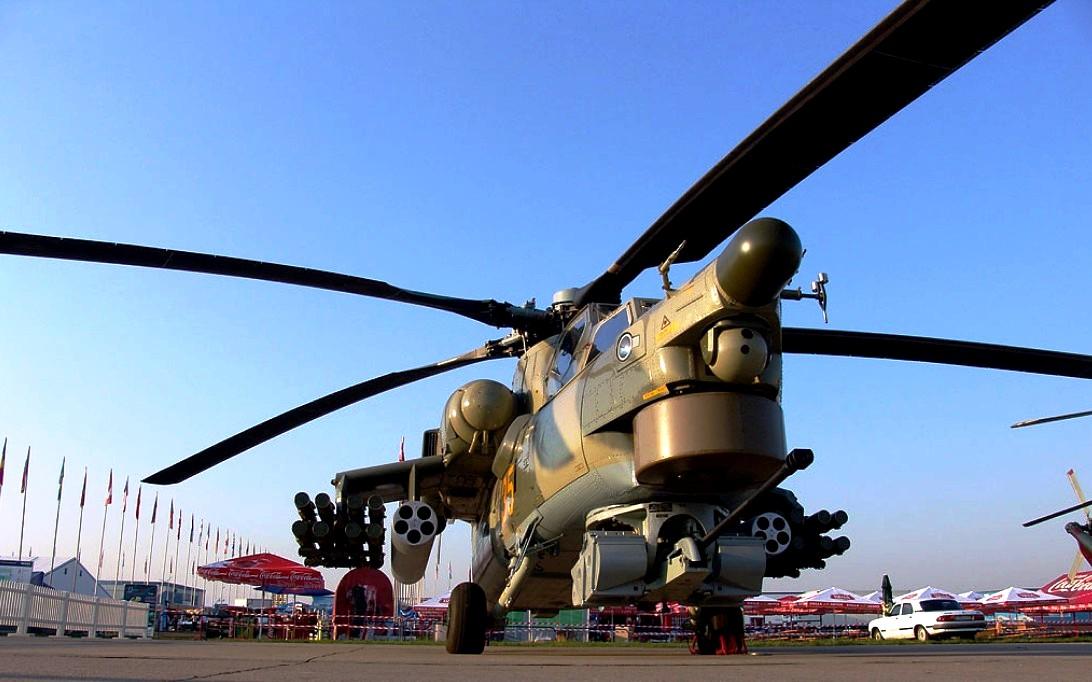 |
| size image : 1092 x 682 |
Mi-28 Havoc (wallpaper 3)
Mi-28 Havoc aircraft images wallpaper gallery 3. Mi-28 Havoc airplane pictures and images collection 3.
Helicopter Aircraft. Then the Mi-28N, was unveiled in 1995, the N designation meaning "night". The prototype (no. 014) first flew on 14 November 1996. The most significant feature is a radar in a round cover above the main rotor, similar to that of the American AH-64D Longbow Apache. Mi-28N also has improved Tor vision and an aiming device under the nose, including a TV camera and FLIR. Due to funding problems, development was interrupted. A second prototype with an improved rotor design was unveiled in March 2004 at Rosvertol. Changes in the military situation after the Cold War made specialized anti-tank helicopters, like Ka-50, less useful. On the other hand, its all-weather, two-seat variant Ka-52 had worse performance due to increased weight. The advantages of the Mi-28N, like all-weather action ability, lower cost, and similarity to the Mi-24, have become important. Mi-28 Havoc (wallpaper 3). Mi-28 Havoc aircraft images wallpaper gallery 3. Mi-28 Havoc airplane pictures and images collection 3. In 2003, the head of Russian Air Forces stated that the Mi-28N will become the standard Russian attack helicopter. A range of ordinance can be carried by the MI-28 including rocket pods and AT-missiles. The Havoc is designed to be multi-role and a full compliment of air-to-air missiles can be carried in the escort role. The MI-28's NPPU-28 30mm cannon uses the same ammunition as Russian armored units.The Havoc's gun has been designed to be dual role - it is equally effective at engaging ground and air targets. The Mi-28N's fire control system includes a helmet-mounted target designator which is slaved to pilot's line of sight. Sensors include narrow/wide field-of-view optical and video. A microwave radar fitted in a pod over the rotor can detect, target and anti-tank guide missiles. Other sensors include a forward-looking infrared (FLIR) system. The Havoc's laser designator is housed beneath the helciopter's nose. The improved MI-28N has additonal radar/flir/low-light video sensors in a mast-mounted dome above the rotors. Mi-28 Havoc (wallpaper 3). Mi-28 Havoc aircraft images wallpaper gallery 3. Mi-28 Havoc airplane pictures and images collection 3.
Mi-28 Havoc (Wallpaper 1)Mi-28 Havoc aircraft images wallpaper gallery 3. Mi-28 Havoc airplane pictures and images collection 3.
Helicopter Aircraft. Then the Mi-28N, was unveiled in 1995, the N designation meaning "night". The prototype (no. 014) first flew on 14 November 1996. The most significant feature is a radar in a round cover above the main rotor, similar to that of the American AH-64D Longbow Apache. Mi-28N also has improved Tor vision and an aiming device under the nose, including a TV camera and FLIR. Due to funding problems, development was interrupted. A second prototype with an improved rotor design was unveiled in March 2004 at Rosvertol. Changes in the military situation after the Cold War made specialized anti-tank helicopters, like Ka-50, less useful. On the other hand, its all-weather, two-seat variant Ka-52 had worse performance due to increased weight. The advantages of the Mi-28N, like all-weather action ability, lower cost, and similarity to the Mi-24, have become important. Mi-28 Havoc (wallpaper 3). Mi-28 Havoc aircraft images wallpaper gallery 3. Mi-28 Havoc airplane pictures and images collection 3. In 2003, the head of Russian Air Forces stated that the Mi-28N will become the standard Russian attack helicopter. A range of ordinance can be carried by the MI-28 including rocket pods and AT-missiles. The Havoc is designed to be multi-role and a full compliment of air-to-air missiles can be carried in the escort role. The MI-28's NPPU-28 30mm cannon uses the same ammunition as Russian armored units.The Havoc's gun has been designed to be dual role - it is equally effective at engaging ground and air targets. The Mi-28N's fire control system includes a helmet-mounted target designator which is slaved to pilot's line of sight. Sensors include narrow/wide field-of-view optical and video. A microwave radar fitted in a pod over the rotor can detect, target and anti-tank guide missiles. Other sensors include a forward-looking infrared (FLIR) system. The Havoc's laser designator is housed beneath the helciopter's nose. The improved MI-28N has additonal radar/flir/low-light video sensors in a mast-mounted dome above the rotors. Mi-28 Havoc (wallpaper 3). Mi-28 Havoc aircraft images wallpaper gallery 3. Mi-28 Havoc airplane pictures and images collection 3.
Mi-28 Havoc (Wallpaper 2)
Mi-28 Havoc (Wallpaper 4)
No comments:
Post a Comment